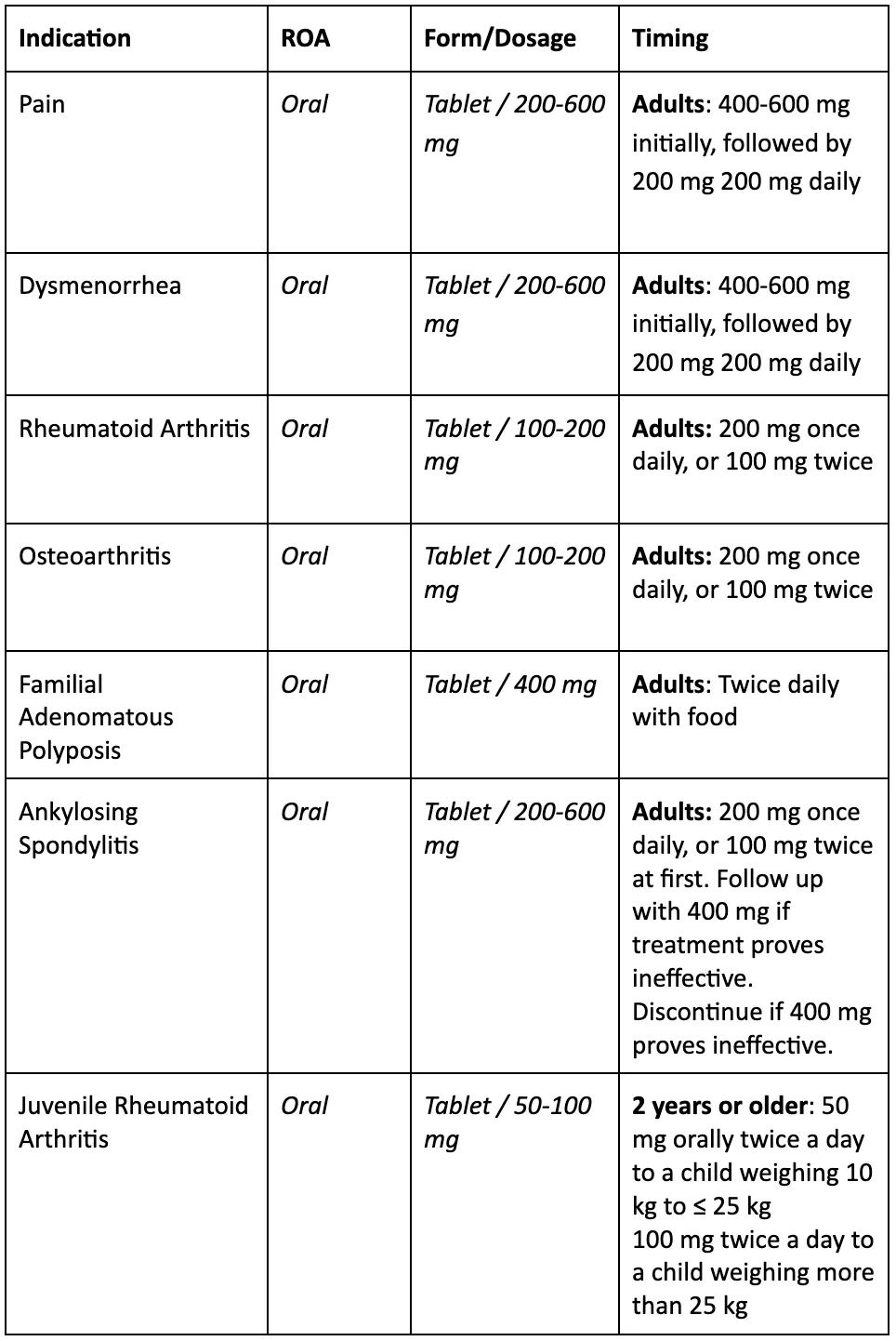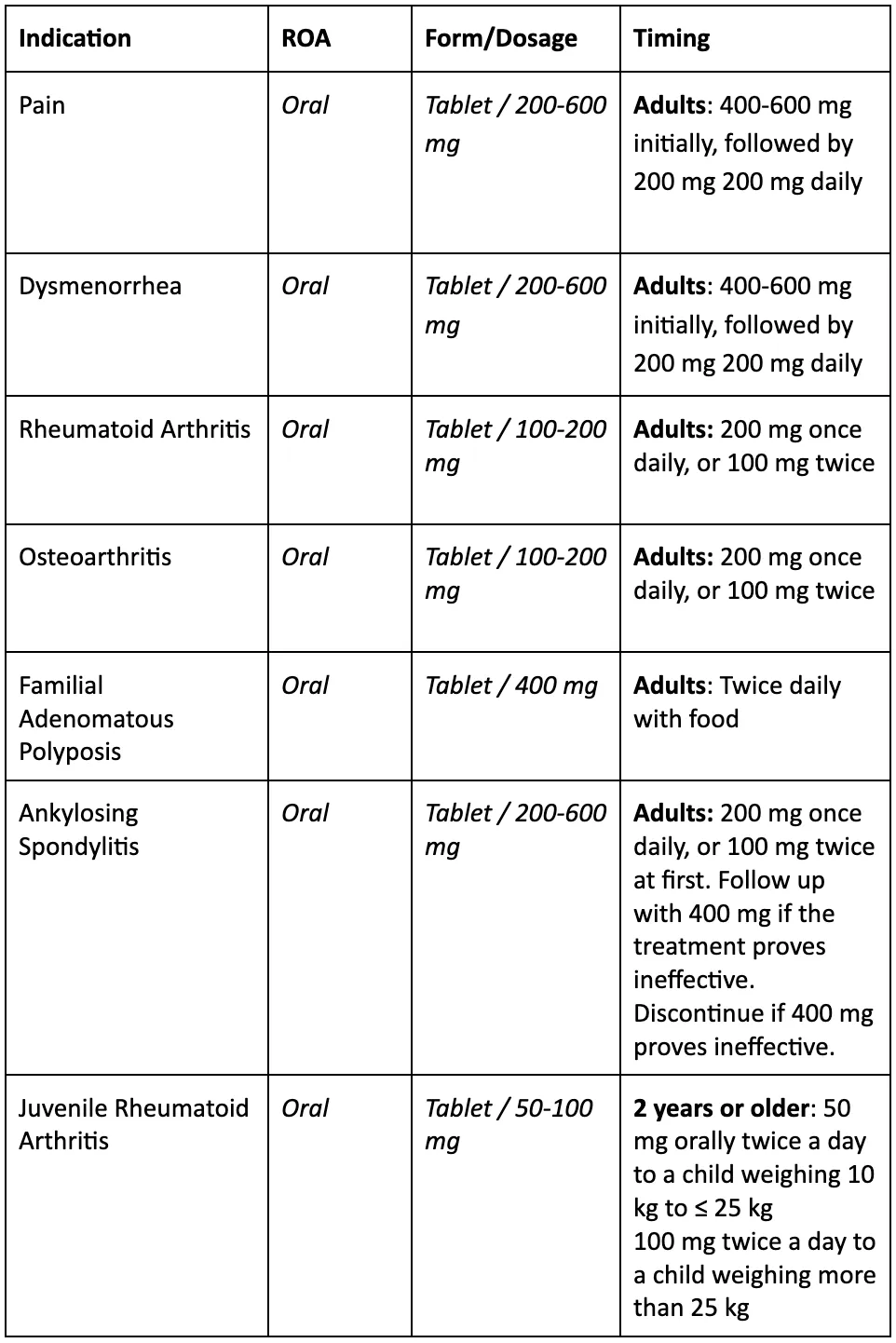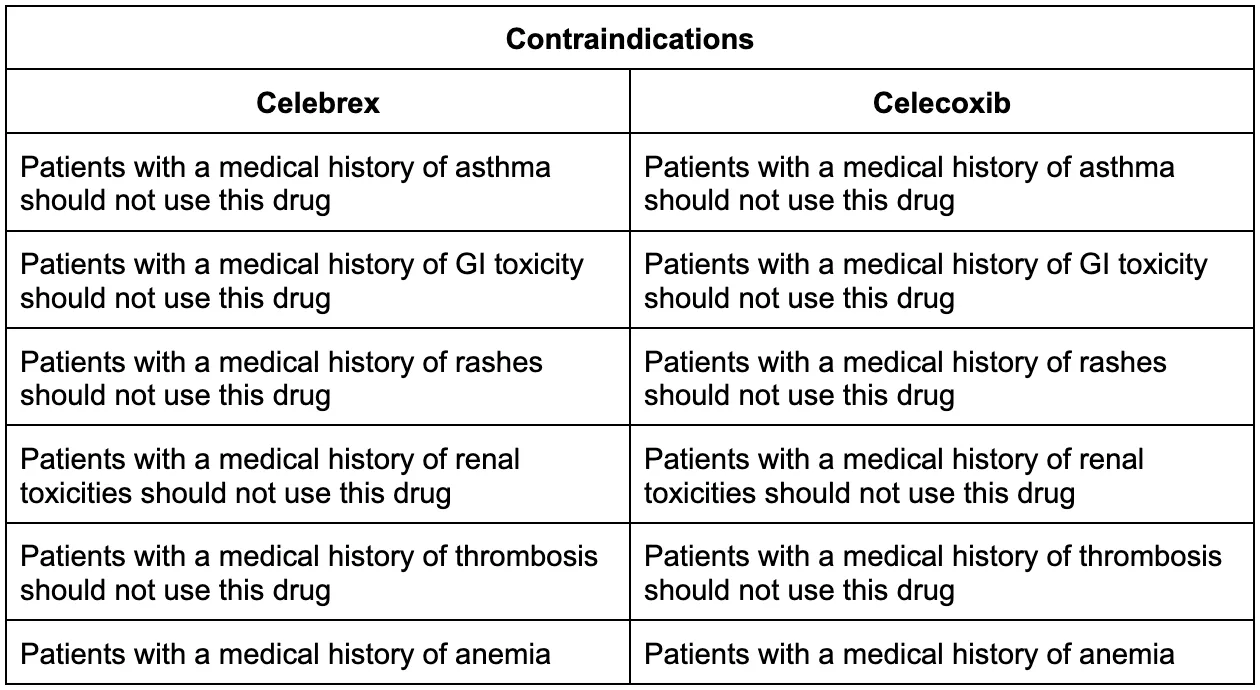Celebrex vs Celecoxib
Introduction
NSAIDs (non-steroidal anti-inflammatory drugs) have been the preferred anti-inflammatories for decades. In the world of pharmaceuticals, the introduction of new NSAIDs to the market has merely been a struggle towards perfecting chemical compositions to reduce side effects and increase efficacy. Celebrex, a brand name for Celecoxib, also belongs to the same class of medications known as NSAIDs. This drug is commonly prescribed to patients complaining of pain, inflammation, and muscular stiffness caused by arthritis. It can also be used for pain resulting from other conditions.
The management of the symptoms of arthritis has often been the subject of great research. Clinical trials built around finding a solution for this illness, or at least discovering NSAIDs to manage the pain, have often led to remarkable results. Celebrex is a result of one of these trials. Often employed for the treatment of osteoarthritis, rheumatoid arthritis, and ankylosing spondylitis, these medications address the cause of pain. This is why they are also highly effective in managing menstrual cramps or postoperative procedures.
The therapeutic effects and many benefits of Celebrex for patients of arthritis result from their unique chemical composition. Celecoxib (brand name Celebrex) works by inhibiting the activity of COX-2 (cyclooxygenase-2), an enzyme responsible for pain, inflammation, and swelling. COX-2 increases the production of prostaglandins in the body, ultimately leading to pain and other symptoms. Celebrex works on inhibiting prostaglandins to make the symptoms of arthritis more manageable.
About Celebrex and Celecoxib
What is Celebrex?
Celebrex (generic name Celecoxib) is an NSAID that is usually prescribed to patients complaining of pain, inflammation, and stiffness. Although these symptoms are commonly linked to arthritis in the case of Celebrex-related treatments, they can also be associated with other causes, such as menstrual cramps.
Celebrex was first developed by G.D. Searle & Company, now a part of Pfizer Inc, and was approved by the FDA by the end of 1998. This development was encouraged by a need for a drug for arthritic pain management that avoided severe gastrointestinal side effects. Despite multiple criticisms over the years, Celebrex has been developed and modified through clinical trials. Dosage recommendations and warning labels have also been adjusted by the FDA to increase patient safety.
What Conditions Is Celebrex Approved To Treat?
Celebrex is usually prescribed to patients dealing with arthritis, including osteoarthritis, rheumatoid arthritis, and ankylosing spondylitis, which usually leads to symptoms of chronic pain. Doctors can also prescribe it to certain patients suffering from extreme menstrual cramps or postoperative procedures. Moreover, due to the selectivity of Celebrex to the COX-2 enzyme, doctors may also prescribe Celebrex to patients with familial adenomatous polyposis (FAP), which causes polyps in the colon and rectum.
Celebrex is approved by the FDA to treat the following;
- Osteoarthritis: This is a condition that leads to the degeneration of joints. This medication can benefit patients complaining of pain, inflammation, or stiff joints.
- Rheumatoid Arthritis: Rheumatoid arthritis may affect both children (Juvenile Rheumatoid Arthritis) and adults and usually leads to painful joint inflammation, swelling, and discomfort. Celebrex is an effective medication that helps patients manage pain caused by this form of arthritis.
- Acute Pain: Celebrex is also administered to patients who complain of acute pain (pain that may arise in a brief period and stay for a short time). Management of different kinds of pain, such as those caused by menstrual cramps, dental procedures, or postoperative pain, is common.
- Ankylosing Spondylitis: Celebrex is an effective treatment option for patients looking to alleviate symptoms of ankylosing spondylitis, which typically causes inflammation in the joints of the spine. It can alleviate pain and stiffness and lead to better mobility.
- Familial Adenomatous Polyposis (FAP): Celebrex can be used to manage FAP, leading to polyps forming in the colon and the rectum. This is a rarer genetic condition that may be hard to manage otherwise.
It is essential to remember that any of the uses of Celebrex depend upon the doctor’s discretion. Only a medical professional can let you know whether the prescribed medication is advisable for you or not. It is important to ask your doctor before relying on dosage or duration of treatment as they can better evaluate how the medicine will react to your unique conditions.
How Does Celebrex Work for Arthritis?
Celebrex targets the COX-2 enzyme and inhibits prostaglandin production, ultimately reducing inflammation and pain and making arthritis more manageable. Unlike many other NSAIDs, Celebrex is much more effective and faster at managing arthritic pain. This is because it is much more effective at selectively targeting COX-2 enzymes. This selectivity also allows it to prevent severe gastrointestinal effects in patients, which often cause ulcers or bleeding of the stomach lining. Although Celebrex is an effective treatment for arthritis, it may react badly with certain medications, conditions, and foods. It is important to consult a doctor before relying on medication for pain management. Signs and symptoms of gastrointestinal issues such as ulcers, regularly upset stomach, and bleeding, along with cardiovascular disturbances, should be reported to your doctor. Your doctor can recommend the appropriate dosage which helps manage the disease instead of causing more health concerns.
What is Celecoxib
Celecoxib is the generic name of the medication commonly known as Celebrex. An NSAID commonly used to treat pain, inflammation, and stiffness, Celecoxib has proved its efficacy for symptoms of arthritis. In the long run, Celecoxib can also increase mobility for patients complaining of joint pain.
Celecoxib (brand name Celebrex) was first developed and marketed by G.D. Searle & Company. In 1998, FDA provided it with its first approval, and it began to be used for osteoarthritis and rheumatoid arthritis. Interestingly, Celecoxib was the first selective COX-2 inhibitor to receive approval from the FDA. By 1999, Celecoxib was made available to the market by Pfizer Inc., and it was provided the brand name Celebrex. Throughout the early 2000s, it was used popularly as a drug for arthritic pain management. However, safety concerns arose in 2004 when a study revealed cardiovascular risks associated with the medication.
By 2005, FDA updated the labels for Celecoxib, and later studies revealed unclear results regarding the cardiovascular effects of Celecoxib. Over the years, Celecoxib has remained on the market as an effective and safe drug when used in the dosages recommended by a doctor.
What Conditions Is Celecoxib Approved to Treat?
Celecoxib is approved to treat the same conditions as listed above. These include;
- Osteoarthritis
- Rheumatoid arthritis
- Ankylosing spondylitis
- Menstrual cramps and related pain
- Dental pain
- Postoperative pain
How Does Celecoxib Work for Arthritis?
Celecoxib works at inhibiting COX-2 enzymes selectively, which ultimately reduces the production of prostaglandins and thus helps increase joint mobility. This is accomplished by decreased pain, inflammation, and swelling. Selectively inhibiting COX-2 enzymes is the reason it has proved to be less triggering for the stomach lining. This allows patients to avoid gastrointestinal side effects.
Effectiveness
How Effective Are Celebrex and Celecoxib for Treating Arthritis?
Over the years, different clinical trials and studies have vouched for the safety and efficacy of Celebrex. In a paper published in 2018, Celecoxib was shown to improve pain when compared to a placebo. Moreover, compared to other NSAIDs, Celecoxib was shown to cause fewer gastrointestinal ulcers. This finding proved that Celecoxib was a valuable NSAID for people with gastrointestinal issues. Although improvement in pain and physical function was similar to other NSAIDs, combined with reduced side effects on the stomach can benefit many patients in the long run.
In another paper published in 2016, an analysis of the usage of 200mg of Celecoxib orally every day showed better results when compared to the group using the placebo. It reduced pain and increased mobility. Moreover, fewer side effects were observed after 10 to 13 weeks of treatments.
Dosage information
How is Celebrex Administered for Arthritis?
Celebrex Dosage Information
For Celecoxib to be effective, it must be taken once or twice daily with an average recommended dose of 200 to 400 mg per day. The drug is commonly used for both rheumatoid arthritis and osteoarthritis. However, it is important to consult a medical professional as they can give you more information on the recommended dose for your condition and medical history. For the best results, take the pills at the same time every day, with or without food.
Here are the average dosage recommendations;

How is Celecoxib Administered for Arthritis?
Celecoxib dosage information

Side Effects
It is important to read some of the common side effects and interactions on the label before using the medication. It is recommended you let the doctor know of any past illnesses or medications you are currently taking to avoid interactions that can worsen a condition or cause serious side effects.
What Are the Most Common Side Effects of Celebrex?
Some common side effects of Celebrex include;
- An upset stomach
- Pain in the stomach
- Indigestion or heartburn
- Feeling nauseous
- Lightheadedness
- Upper respiratory tract infection
- Headache
- Swelling
- Sore throat
- Congestion
Although the side effects listed above are common, they aren’t normally experienced by everyone. Certain individuals may have no reaction at all. However, if these side effects are noticed and they persist, it is essential to consult a medical professional. Moreover, if you notice any serious side effects, visit the ER immediately!
Are There Any Potential Serious Side Effects of Celebrex?
* If you experience any of these serious side effects, seek medical help immediately
Serious side effects are much rarer. However, if you do notice signs of the side effects mentioned below, don’t hesitate to consult a medical professional. Here are some you need to look out for;
- Cardiovascular side effects: Celebrex may lead to a heart attack, stroke, or other cardiovascular events in certain cases, especially when used for prolonged periods.
- Gastrointestinal side effects: Celebrex can increase the risk of developing stomach ulcers, bleeding, perforation, and pain, especially in people who complain of gastrointestinal issues or take certain medications that can trigger these effects.
- Allergies: Celebrex can trigger certain allergies, which may lead to hives, rashes, breathing issues, swelling, and more.
- Kidney function: Celebrex can impact kidney function and cause kidney injuries or diseases.
- Liver function: Celebrex can impact liver function and cause damage or inflammation to the liver. In some cases, it may also lead to abnormal liver function tests.
What Are the Most-Common Side Effects of Celecoxib?
The side effects of Celecoxib can be found listed above.
Are There Any Potential Serious Side Effects of Celecoxib?
* If you experience any of these serious side effects, seek medical help immediately
The serious side effects of Celecoxib are found listed above.
Contraindications and Interactions
Warnings and general precautions for Celebrex and Celecoxib
Understanding the contraindications and interactions of Celecoxib (brand name Celebrex) is important. This is to avoid any serious side effects that can potentially endanger a life. Celebrex can pose much more serious side effects for patients with cardiovascular issues, so it is important to ask your doctor for an adjusted dose and discontinue usage once the symptoms have been managed. In case of chronic pain, it is advisable to consult a doctor who can weigh the costs and benefits of the prescription before providing it to you.
Remember that NSAIDs can react with certain medications and worsen the effects of existing ailments. You should conduct your due research and ask the doctor for advice before taking any prescription medicine.
Contraindications and important interactions for Celebrex and Celecoxib


Cost Comparison
How much do Celebrex and Celecoxib cost?
The cost for Celebrex in oral capsule form (200 mg) is approximately $244 for 30 capsules. This cost can vary depending on the pharmacy you visit. Considering an average patient takes one capsule of 200 mg a day, it will cost them $244 monthly to opt for treatment through Celebrex.
Popularity of Celebrex and Celecoxib
In 2020, Celecoxib ranked at number 98 in the list of top drugs in the United States. It sold around 7,089,211 prescriptions as of 2020 to an estimated number of 1,800,049 patients.

According to this table, Celecoxib ranks sixth out of the most popular NSAIDs. Following drugs like Ibuprofen and Aspirin and being more popular than Dexamethasone, Nabumetone, or Flurbiprofen, Celecoxib has maintained a great reputation in the pharmaceutical industry.
Conclusion
Takeaway
Celecoxib (brand name Celebrex) has established a great reputation for itself in the market. With the efficacy and safety established in medical trials, Celebrex has proved to be a strong anti-inflammatory and pain medication for many years. Its treatment of the symptoms of arthritis has led to many benefits for patients.
It is important to note that different brand names of medications might contain slight changes in the ingredients. Patients must inform their doctor of any allergies to avoid side effects such as skin allergies, hives, and serious allergic reactions. If you are considering using Celecoxib for pain relief, speak to a medical professional for the recommended dosage.